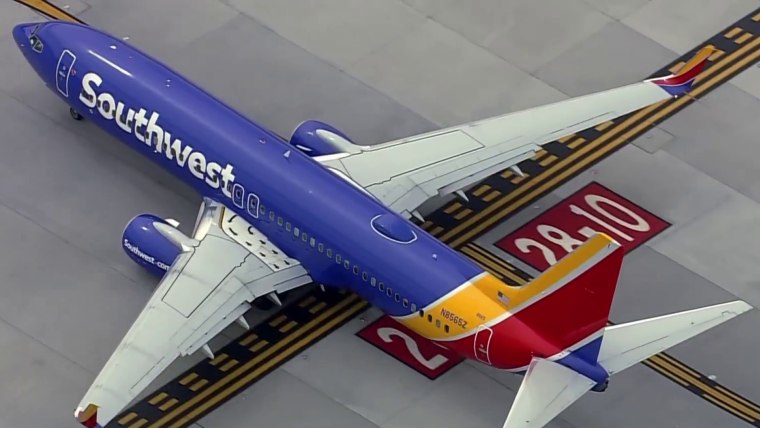[ad_1]
There’s little question that Southwest’s holiday meltdown was the worst customer service debacle in U.S. airline history, setting a new low by stranding more than 1 million paying passengers. But some of us weren’t at all surprised: Southwest’s crisis was inevitable after years of lax oversight by the Transportation Department, as well as the airlines’ prioritizing stock dividends and executive compensation over necessary investments, including the frighteningly outdated IT and crew scheduling systems that Southwest’s own employees warned about.
As an aircraft dispatcher licensed by the Federal Aviation Administration who spent seven years in airline flight operations management, and as someone who has been advocating for passengers since 2000, I can assure you that last week was not about snowstorms (or just about Southwest). The travel chaos resulted from all airlines’ straining their operations to the max by not making proper investments in personnel and technology, scheduling flights without adequate staffing and filling cabins to the bursting point so that any interruption spurred massive disruptions, stranding passengers and baggage alike from coast to coast.
It’s unlikely Southwest and other airlines would have stranded so many passengers if they feared real consequences
Two camps have emerged on social media: It’s all Southwest’s fault! No, it’s all DOT’s fault! I can tell you without hesitation: Both the airlines and the Transportation Department are at fault. America’s commercial aviation system is broken, but so is the only regulatory agency allowed to oversee it.
That’s because of two words: “federal preemption.” The phrase, included in the Airline Deregulation Act of 1978, means flyers have fewer rights when interacting with airlines than with just about any other industry — limited ability to sue in state courts, no actions from state attorneys general, no bills by state legislatures. Only Congress and the Transportation Department oversee airlines, and the department and its subsidiary, the FAA, have long struggled with a dual mandate to both promote and regulate airlines. That has made for toothless enforcement on dozens of consumer and safety issues.
Consider what we’ve seen from the federal government since Covid hit. For starters, airlines withheld at least $10 billion in unpaid refunds and unused flight credits after the pandemic forced people not to fly in 2020 and beyond. In November, Secretary Pete Buttigieg finally imposed what he termed “historic” fines. But only Frontier and five small foreign carriers were penalized.
The major U.S. airlines — which were led by United, with more than twice as many DOT refund complaints as any other airline — weren’t fined so much as $1. The department told consumer advocates that all other outstanding refunds from domestic airlines were paid, but it didn’t detail what the amounts were or how long it took for repayment.
Then, the first half of 2022 had an unprecedented number of delayed and canceled flights, more than in all of 2021. Despite warnings from lawmakers and groups like my organization, the American Economic Liberties Project, Buttigieg assured passengers in September that the airlines would address their scheduling problems.
Unfortunately, he didn’t use his authority under the Transportation Department’s unfair and deceptive acts rule to investigate why tens of thousands of flights were scheduled and then paid for by consumers, only to be canceled. Worse, there have been no reported penalties for the cancellations. This lack of enforcement may have contributed to Southwest’s Christmas meltdown, because it’s unlikely Southwest and other airlines would have stranded so many passengers if they feared real consequences.
Of course, much of the lack of oversight is long-standing. The problem of separating parents and children on flights is a case in point. Back in 2016, Congress told the transportation secretary to direct U.S. airlines not to charge fees for kids under 13 to sit with their families. Three administrations and 6½ years later, we’re still waiting.
I requested access to documents in a Freedom of Information Act investigation and found dozens of complaints to the Transportation Department about kids with issues such as autism and some as young as 4, 3, 2 and even 1 being seated separately. Finally in July, Buttigieg acted — only to kick the can. Rather than announce he was following the 2016 directive, he said he would be “calling on” the airlines to do the right thing. If they didn’t, he warned, the Transportation Department “will be prepared for potential actions.”
Underlying all these problems are the mega-mergers (American-US Airways, United-Continental, Delta-Northwest) that were allowed to happen a decade ago, making the airlines too big to fail. That reality has been made clear by the fact that airlines’ congressional bailouts exceeded those of all other industries affected by the pandemic.
Now we’re in an era we’ve never experienced before: dramatic concentration that has led to American, Delta and United’s controlling nearly two-thirds of the U.S. market and no new-entrant airlines from 2007 to 2021. With passenger loads we haven’t seen since the 1950s, U.S. airlines now operate 24/7 at nearly peak capacity.
Obviously the airline industry also has become too big to care, despite the $54 billion taxpayer bailout during Covid. Since then, the U.S. airline industry has returned to profitability and, in some cases, notched record revenues.
Enough is enough. Domestic airlines are mistreating passengers with impunity and are clearly unafraid of backlash from consumers, the media or the Transportation Department. Since the Transportation Department won’t use its authority as the only sheriff in town to force better behavior from the airlines, it’s time to allow other lawmakers to step up.
My organization recently drafted model legislation that would eliminate federal preemption for airlines and empower state courts, state attorneys general and state legislatures to do what the Transportation Department won’t: regulate airline behavior. The time has come to reach out to members of Congress and state attorneys general to change our broken laws and rein in the excesses of this vital but broken industry.
[ad_2]
Source link

